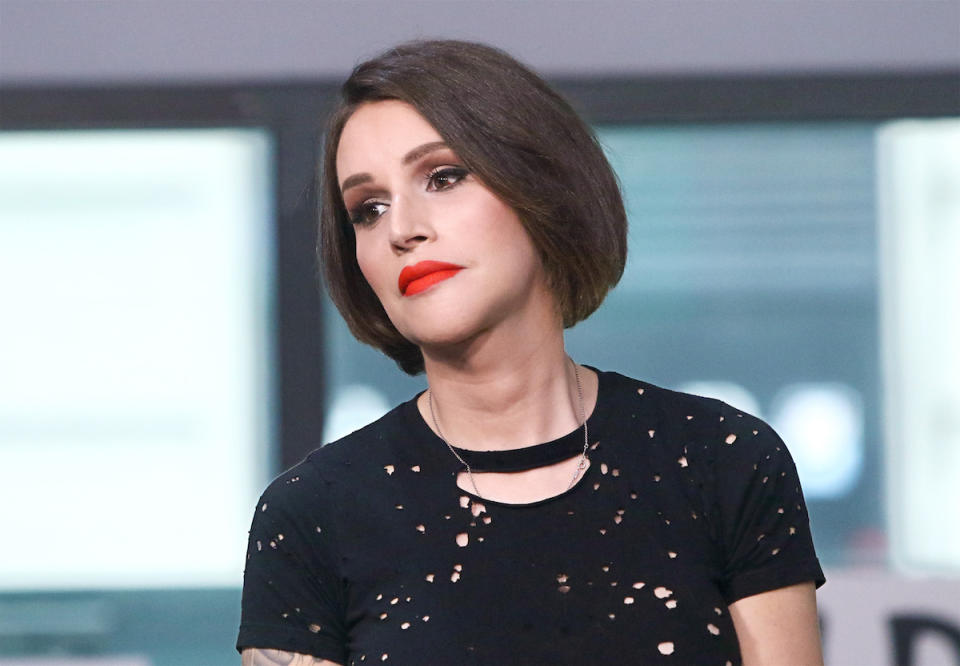Why it matters that transgender women are speaking out about Jeffrey Tambor — and that people are listening

Jeffrey Tambor has won an Emmy and a Golden Globe, critical accolades, and numerous blessings from LGBTQ organizations for portraying a woman transitioning midlife for four seasons of Amazon’s acclaimed series Transparent — which is why it was all the more concerning that the woman who lodged sexual harassment complaints against the actor last week is transgender.
Tambor’s former assistant Van Barnes was the first to come forward, in a private Facebook post, with claims her boss made multiple sexual advances, lewd comments, and threats toward her, all of which Tambor denied, calling them “baseless” in a statement released soon after. Two days later, Trace Lysette, one of the few recurring trans actresses on Transparent, released a #MeToo statement of her own. It detailed a specific moment she’d had on set in which Tambor allegedly thrusted his body on hers, as well as recalling “multiple uncomfortable experiences” she felt the need to speak up about now that the conversation of Hollywood sexual harassment had finally become part of public discourse.
Since then, Tambor has reportedly exited the show, saying, “What has become clear over the past weeks, however, is that this is no longer the job I signed up for four years ago. I’ve already made clear my deep regret if any action of mine was ever misinterpreted by anyone as being aggressive, but the idea that I would deliberately harass anyone is simply and utterly untrue. Given the politicized atmosphere that seems to have afflicted our set, I don’t see how I can return to Transparent.”
Despite a cast and crew of LGBTQ people and allies, few involved with the show have spoken in support of Barnes or Lysette. Showrunner Jill Soloway released an early statement indicating she was in support of investigating the matter further, and Our Lady J, a producer of the series and the only trans woman writer on staff, posted Lysette’s story on Instagram with a caption sharing her own thoughts. It read, in part: “Any abuse of power is inexcusable, but hearing the stories of Van and Trace have particularly shattered me. I honor the strength and courage that it must have taken for them to tell their truth.”

While Amazon, Soloway, and the rest of the people behind Transparent are struggling with how to continue a show that can no longer be about Tambor’s central character, Maura Pfefferman, the trans women who have come forward to share their stories of harassment seem to be experiencing something largely denied in similar scenarios: People are not only listening to them, but believing them and advocating on their behalf. And that has not typically been the case for trans women, who have often found themselves labeled as having “deserved” any form of sexual assault or violence they’ve been subject to.
“Given that the culture has routinely erased or mocked us for generations, men have reason to believe that either no one will believe our stories, or simply not care, as long as trans women are the only victims,” says trans writer and actress Jen Richards, who co-created and starred in the Emmy-nominated digital series Her Story and has also appeared on Nashville, Better Things, and Doubt. She notes that trans women are “particularly vulnerable for a dizzying number of reasons.”
“For starters, straight men have a tremendous anxiety around their attraction to us, which often leads to violence, or at the very least an intense need for secrecy,” Richards tells Yahoo Lifestyle. “Some men will see us as particularly vulnerable, given that society has traditionally viewed our gender as ‘deceptive,’ and others will project a traditionally male sense of sex onto trans women, or even hypersexualize us, as if we only transitioned because we wanted such sexual attention.”

Trans women are particularly susceptible to being sexually harassed or assaulted, and often face both transphobia and misogyny, which means their general worthiness is positioned lower than that of cisgender women, especially if they are trans women of color. Trans activist and writer Ashlee Marie Preston says it’s the hypersexualization and fetishization of trans women’s identities that inevitably give men the misguided idea that trans women are not only receptive to sexual attention from them, but are seeking it out.
“There’s already an attitude among perpetrators that you can’t rape or harass the willing,” Preston says. “Society views trans women as sexual deviants, and many believe that we ‘ask for it’ or ‘bring it on ourselves’. As trans women we’re expected to function as sexual objects and an aide in satisfying the cis-hetero male libido. We’re demonized and criminalized as perverts out to trick and deceive cis hetero men; therefore anything that happens to us, we ‘had coming.’”
A 2017 National Task Force report found that 50 percent of trans or gender-nonconforming respondents had been harassed by someone in the workplace and yet, because so many trans people have difficulties finding and keeping employment in the first place, many of them don’t report or make a complaint about their harasser.
When it comes to Hollywood, the hiring and representation of trans people is dismally low. Onscreen, GLAAD found there to be only nine regular and recurring trans women characters on television in 2017, including broadcast, cable, and streaming networks. With a show like Transparent being an award-winning critical darling that also hailed itself as the largest employer of trans people in L.A., the loss would be especially unfortunate for trans cast and crew. It would make it all the more difficult and pivotal for women like Barnes and Lysette to add their voice to the chorus of cisgender actresses voicing their experiences with the likes of Harvey Weinstein, Louis C.K., Brett Ratner, and now Charlie Rose.

Richards says she believes Barnes and Lysette’s complaints are being heard and respected now because they followed after cis actresses, who are still seen as more reputable. Shadi Petosky, who created the animated Amazon series Danger & Eggs, agrees.
“I think [trans women] are still seen as unreliable witnesses,” Petosky says. “People who come forward from abuse don’t do it to claim their prizes. It’s usually to prevent trauma from happening to others. I hope this allows other trans women to come forward and get to work in spaces with some dignity.”
Transgender activist and writer Eli Erlick says that trans women are still too often positioned as the predators themselves, allowing some to see them as incapable of being victims. The politicization of trans bodies directly correlates into how credible (or noncredible, as is usually the case) trans women are seen to be.
“The myth of transgender women being harmful is a part of rape culture,” Erlick says. “I have had vicious campaigns against me by trolls, trans-exclusionary feminists, and evangelical organizations attempting to delegitimize my story through these methods. I know the same is true for many other trans women and the trans community at large. Almost everyone in the U.S. has now seen anti-transgender ads for bathroom bills, claiming that we only want access to restrooms for nefarious reasons rather than simply being able to pee. This is part of the normalization of blaming trans people for our own oppression. It is part of the culture of sexual harassment against trans women.”
Trans women are subject to harassment in various forms, from invasive questions to public conversations about genitalia, surgeries, or other comments that Erick says she’s personally found “humiliating and dehumanizing.”

“I was once asked by a reporter about the shape of my genitalia when I was 17 years old,” she says. “This was a 40-something man asking me to describe my genitalia on TV while I was in high school. It was unacceptable and something that cisgender women don’t have to go through. These sort of questions have unfortunately become normalized through the sensationalism of trans people and our transitions. This brings up the larger issue that our bodies are uniquely considered public property.”
On Transparent, Maura and other trans women like Lysette’s character Shay are subject to similar indecencies posted by both well-meaning family and friends or ill-intentioned strangers, so Tambor’s alleged on- and off-set conduct is especially egregious. If the show is canceled by Amazon, it will largely affect the trans people who have been hired to work on the show — in front of and behind the camera — which has inevitably helped to usher in a new understanding of trans and gender-nonconforming people.
“If Transparent is canceled because of Tambor’s departure, many trans people will lose their jobs,” Richards says. “That’s not an argument to spare any of these men, or their projects, but rather another indication of the greater systemic imbalance. A show that initially built its acclaim because of trans issues should never have been wholly dependent on the power of a single man in the first place. “
Erlick is concerned that Tambor’s onscreen portrayal of a trans woman will lead some viewers to equate his alleged harassment with the myth that trans women are ultimately predators.
“Removing Tambor as its star shouldn’t be the end of its story but instead the chance to recenter trans women within our own narratives,” Erlick says, a sentiment echoed not only by Lysette but other trans people who hope to see Amazon keep the show despite Tambor’s departure.
“Trace and Van’s courage to speak out on Tambor’s egregious conduct sends the message that trans women are rejecting sexual exploitation and harassment, and that we, much like our cis sisters, will not tolerate abuse in any form,” Preston says.
“I don’t think the Transparent situation is particularly relevant in the singular, but rather inasmuch as it’s part of a sweeping indictment of male abuse of power it helps all women,” Richards says, “which includes us.”
But Petosky believes the show made a huge misstep casting a cis man like Tambor in the first place, as the fear for any underrepresented community is that they will be seen as caricatures — and in the case of trans women, that they are simply cis men putting on a wig, a dress, and some makeup that they can remove at the end of the day.
“The community knew this would cause harm from day one,” she says. “I am so glad it is over. History won’t understand the gold statues cis people gave each other for pretending to be us.”
Barnes and Lysette’s coming out with their stories of sexual harassment have signaled there might be a much-needed sea change when it comes to the public seeing trans women as not only honest and reliable, but worthy of respect and support instead of the disdain and distrust they’ve been subject to for decades.
“It is unfortunate that it took powerful, white cis women speaking out for the public and media to finally listen,” Erick says. But she acknowledges things would have been different were Barnes and Lysette to have come forward before now.
“These accusations would not have been respected if they had come out about them months ago,” she says. “People are finally listening to trans women for the first time, which is wonderful.”
Read more from Yahoo Lifestyle:
Trans woman shares gender expressions journey, from ‘femme to dapper’
Chelsea Manning beauty exclusive: ‘This is an expression of my humanity’
Follow us on Instagram, Facebook, and Twitter for nonstop inspiration delivered fresh to your feed, every day.
